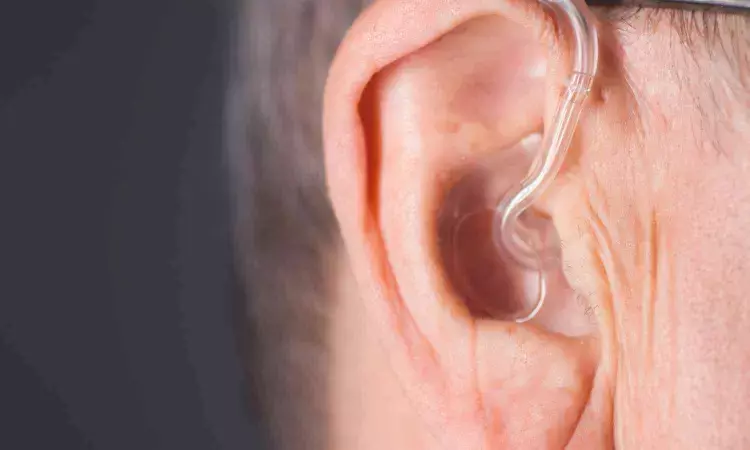- Home
- Medical news & Guidelines
- Anesthesiology
- Cardiology and CTVS
- Critical Care
- Dentistry
- Dermatology
- Diabetes and Endocrinology
- ENT
- Gastroenterology
- Medicine
- Nephrology
- Neurology
- Obstretics-Gynaecology
- Oncology
- Ophthalmology
- Orthopaedics
- Pediatrics-Neonatology
- Psychiatry
- Pulmonology
- Radiology
- Surgery
- Urology
- Laboratory Medicine
- Diet
- Nursing
- Paramedical
- Physiotherapy
- Health news
- Fact Check
- Bone Health Fact Check
- Brain Health Fact Check
- Cancer Related Fact Check
- Child Care Fact Check
- Dental and oral health fact check
- Diabetes and metabolic health fact check
- Diet and Nutrition Fact Check
- Eye and ENT Care Fact Check
- Fitness fact check
- Gut health fact check
- Heart health fact check
- Kidney health fact check
- Medical education fact check
- Men's health fact check
- Respiratory fact check
- Skin and hair care fact check
- Vaccine and Immunization fact check
- Women's health fact check
- AYUSH
- State News
- Andaman and Nicobar Islands
- Andhra Pradesh
- Arunachal Pradesh
- Assam
- Bihar
- Chandigarh
- Chattisgarh
- Dadra and Nagar Haveli
- Daman and Diu
- Delhi
- Goa
- Gujarat
- Haryana
- Himachal Pradesh
- Jammu & Kashmir
- Jharkhand
- Karnataka
- Kerala
- Ladakh
- Lakshadweep
- Madhya Pradesh
- Maharashtra
- Manipur
- Meghalaya
- Mizoram
- Nagaland
- Odisha
- Puducherry
- Punjab
- Rajasthan
- Sikkim
- Tamil Nadu
- Telangana
- Tripura
- Uttar Pradesh
- Uttrakhand
- West Bengal
- Medical Education
- Industry
Self-fit over-the-counter hearing aids provide long-term advantage: JAMA

A new study published in the Journal of American Medical Association showed that self-fit over-the-counter (OTC) hearing aids might be a useful long-term therapeutic strategy for the individuals with low to moderate loss of hearing.
OTC hearing aids have long been utilized as a replacement for the more conventional method of purchasing them from hearing health care providers. They are immediately available to consumers without the need for professional consultation or fitting. Despite the novelty of self-fitting over-the-counter hearing aids, there are still serious industry concerns about their long-term viability and effectiveness in the absence of continuing, direct assistance from audiologists. To assess the long-term self-reported results after eight months of self-fit OTC hearing aids to the identical hearing aids fitted by audiologists, Karina De Sousa and colleagues undertook this study.
This research reevaluated many of the initial participants who were not lost to follow-up, building on a prior randomized clinical trial. The original split of the participants was between the individuals who used audiologist-fitted devices and the individuals who used self-fit OTC hearing aids. After fitting, the participants answered self-reported surveys for around eight months. From April to August of 2022, the University of Pretoria in South Africa hosted the first noninferiority study. The same hearing aids fitted using best practices by a qualified audiologist were given to the audiologist-fit device group. The Abbreviated Profile of Hearing Aid Benefit (APHAB) and the International Outcome Inventory for Hearing Aids (IOI-HA) were used to evaluate the primary outcomes, which were self-reported hearing aid benefit.
They key insights of this study were:
A total of 44 trial participants out of 64 were incorporated in the follow-up study where these individuals were 63.0 (13.2) years old on average (SD), with 21 (47.7%) being male.
The APHAB global score and the IOI-HA total score did not significantly differ between the self-fit and audiologist-fit groups at the long-term follow-up.
For the APHAB global score, there was no clinically significant group-time interaction between the groups from 6 weeks to 8 months. However, there was a significant interaction for the IOI-HA total score, with the self-fit group typically performing better.
Overall, for the individuals with mild to moderate hearing loss, self-fit over-the-counter aids can provide similar long-term advantages compared to the individuals fitted by audiologists.
Source:
De Sousa, K. C., Manchaiah, V., Moore, D. R., Graham, M. A., & Swanepoel, D. W. (2024). Long-Term Outcomes of Self-Fit vs Audiologist-Fit Hearing Aids. In JAMA Otolaryngology-Head & Neck Surgery. American Medical Association (AMA). https://doi.org/10.1001/jamaoto.2024.1825
Neuroscience Masters graduate
Jacinthlyn Sylvia, a Neuroscience Master's graduate from Chennai has worked extensively in deciphering the neurobiology of cognition and motor control in aging. She also has spread-out exposure to Neurosurgery from her Bachelor’s. She is currently involved in active Neuro-Oncology research. She is an upcoming neuroscientist with a fiery passion for writing. Her news cover at Medical Dialogues feature recent discoveries and updates from the healthcare and biomedical research fields. She can be reached at editorial@medicaldialogues.in
Dr Kamal Kant Kohli-MBBS, DTCD- a chest specialist with more than 30 years of practice and a flair for writing clinical articles, Dr Kamal Kant Kohli joined Medical Dialogues as a Chief Editor of Medical News. Besides writing articles, as an editor, he proofreads and verifies all the medical content published on Medical Dialogues including those coming from journals, studies,medical conferences,guidelines etc. Email: drkohli@medicaldialogues.in. Contact no. 011-43720751


